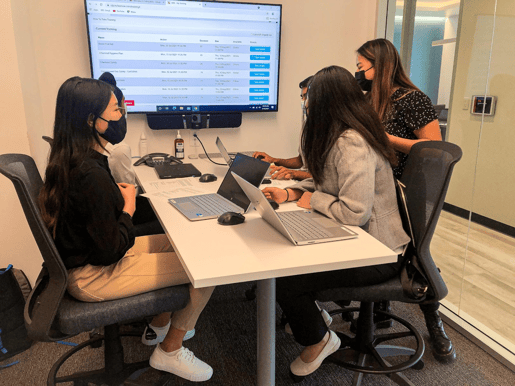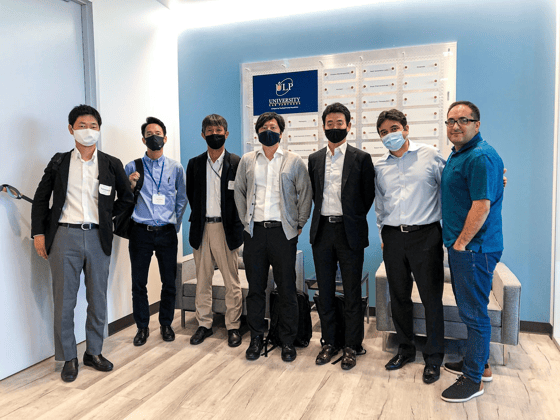An internship is a work experience that provides real-world professional experience and development through practical work to help students become familiar with their career choice. To gain the most from your internship experience, the internship should relate to the student's field of study or future career interests. To effectively reflect the standard internship experience, interns will spend a limited duration working on company projects as a tangible way to learn about the field and test their skills.
The internship will also reflect this real-life experience by offering some form of compensation to the students. In addition to this work experience, internships aim to help students make industry connections and develop the technical and soft skills that are needed to succeed in their line of work. When searching for internships, keep in mind that companies and organizations are interested in students who are genuine and intend on joining a similar line of work in the future.
Internships are an integral part of showing that you have relative work experience in what you studied and you know how to apply it. This assumption comes from the correlation of working with industry professionals who have already established and built their careers. With an internship, you will develop your skill set in an entry-level role. Moreover, you will meet and learn from these professionals about how they built their careers, which you can then apply in your journey through the industry. Such experience is valuable, but have you ever wondered how to land your first internship?
To secure an internship you need to sell yourself and you need to highlight the skills you have attained over the years. With these four steps, you can start adding value to your career journey.
Write a Resume
Find the Right Internship
Apply to Internship
Interview
Never Give Up

The first step to securing an internship is making a resume. You don’t have work experience, but that’s okay. The purpose of the internship is to provide you with a solidified background and expose you to the skills necessary to competently complete the internship. The resume is probably one of the most important parts of the application process and your search for the right internship. To start building your resume outline your educational background and important roles you had (these could be projects). Once you have included all of the technical skills, add additional information, such as volunteer experience or clubs and extracurricular activities to highlight your involvement and show your interpersonal soft skills. Use whatever experience you do have and do not underestimate how it assisted in your career development. Almost any role you had, has helped you develop transferable skills. Showcasing these skills, what you learned, and how you apply these skills is important for employers. Employers want to know that the jobs you held and the courses you’ve taken all had a positive impact in shaping you.
Once you have written your resume, have others review it for you. If you reach out to individuals from companies you are interested in, this connection is the perfect opportunity to ask for their help. Having individuals from the same company of your interest look at your resume helps because they know what their company is looking for. Please note that you will edit your resume several times, especially because you should have multiple reviewers. Solicit as much feedback from others, like your family, friends, or the Career Services department at your school. Keep in mind that a university's career center is always a great resource because the school has developed relationships with different companies in the area. This extra consideration gives those helping you an understanding of what employers look for in a candidate and on their resume. There is plenty of experience they can offer you so drop by.
🔬Learn: How to Write a Resume
After writing your resume it is time to search for the right internship. Choosing the type of internship that is the best model for you is an important part of the learning process. Start by searching for the specific internship that interests you. Use your clear understanding of what type of internship you’re looking for, what type of company fits your overall short-term and long-term goals, and what are the candidate's qualifications. To help you form a clear vision please read on the types of internships that you might consider.
Types of Internships
These internships all have the same foundation but slightly vary depending on the type of experience you want to pursue. It is important to understand the distinction between each position, and how each opportunity can subsequently advance your career development. The following list includes the types of internships available and what they provide.
|
|
College Internship
Most internship opportunities are designed as college internships, meaning they are geared toward college students and meant to be undertaken by continuing university students. These internships may not always require formal work experience, but rather an exposure to a particular field of study, grade point average, and acquired skills. If participating in an internship you will likely be compensated for your time working and can use this experience to speak about future career opportunities and positions.
Externship
An externship is the same as an internship in terms of experience. In an externship, the individual participates in short-term work experience while collaborating with experienced and developed professionals. This experience also aims to provide students with exposure to a “real-world” career position where they hope to be long-term. The externship benefits the individual as they can apply their learning and training outside the classroom. The difference that should be noted is that externships are not for any academic credit and are unpaid positions. The externship will still provide experience for students and sponsors.
Fellowship
A fellowship is an award-based program that usually requires an application and is run by any company's internship program or research program. Since fellowships tend to be based on application, these awards require certain qualifications. When receiving this award the individual is granted the award in the form of monetary value, which is given to support their work and themselves through their work. Most fellowships are given to graduate students or undergraduate students from various backgrounds who are pursuing research. These sponsors can be found through specific medical institutions, big and small research organizations, or a company.
Field Experience
Field experience is the time for a student-learner to actively gain experience in the field. Someone with in-field experience will take what they learned in the classroom and apply it in a hands-on environment under direct supervision. The supervisor serves as a mentor to guide the student and ensure they are correctly applying their knowledge. While it is not an internship, but similar, all individuals taking part in a field experience are gaining their share of “real-world” career experience and developing as a professional. An example of field experience is a nurse. All nurses must complete a certain number of hours before they can be in the medical field on their own. These hours also serve towards your education and license, thus qualifying you for a future job in the field.
For-credit Internship
In a for-credit internship, the intern is in a special program between the university and the active sponsor. The for-credit internship is related to a particular academic topic and can be supported by the sponsor. The purpose of a for-credit internship is to offer college credit in exchange for the student’s work and performance in a real-world setting. More often than not the for-credit internship will be connected to the university and be offered as coursework or in a particular class. The intern is not paid, however, this experience can be used for a recommendation or a referral if you impress the collaborating company.
Full-time/Part-time Internship
A full-time internship refers more to the expected time frame an intern should spend with the company if hired. The interns will either be required to be full-time or part-time. Depending on the internship requirements, this extra consideration will influence the assumed dedication. For an intern to be considered full-time, they will work at or above the threshold for full-time employment. This time is usually between 30 to 40 hours per week. For part-time interns, they might be required to come in less than the full-time interns and employees. That time can range anywhere from 20 to 30 hours per week. Depending on what the intern is balancing at the time they may consider one over the other. For example, if you are a summer intern with no other additional obligations, you might be a full-time intern. In contrast, if you are a current college student enrolled in coursework. Then a part-time internship might be ideal.
Internships Abroad
An internship abroad is an internship program that takes place in a country that is different from the intern's location of home or study.
Virtual Internships
A virtual internship, or a remote internship, is an online internship program that does not require the intern to be physically present on the company's grounds to participate in their work. A common virtual internship generally can only be offered for work that can be fully completed online. Remote work might be coding positions, information technology (IT), marketing, or digitally compatible work.
Co-op
Cooperative education, or a co-op, is a program that combines standard learning with tangible work experience. If you are participating in a co-op program, it will seem similar to an internship, but integrated with the required curriculum to enhance your learning experience.
After reviewing the definition of each internship, one can see that most internships are geared toward college students. Therefore, the best place to start is with your school. Campuses offer multiple resourses for you to begin engaging with the industry and search for positions. These resources might be industry nights, platforms like Handshake, or your school's career center. Most schools have a career center or someone who engages students with resources that they can use to find positions. These contacts from the school will generally keep a record of open positions posted by companies or contacts of known individuals with possible job opportunities. Gather your resume and a list of internship roles you are considering.
After a better understanding of the available opportunities, it is time to apply and submit. “Never count yourself out of an opportunity without trying, because the worst answer you can get is ‘No’.” This reference from a former professor and is perhaps one of the best pieces of advice that can be received. In my attempt to secure my first internship, I was told to apply to as many as possible and simply try. The short and sweet suggestion is to use the resume you originally wrote and then look at the internships you found. Use this information and tailor your resume to the role at the beginning of the application process. If it is desired, consider reaching out to contacts on LinkedIn and let them know in a few sentences who you are and why you are interested in their company.
After applying for all the positions, it comes time to practice for the interview, showcase your best qualities, and have an awesome interview. To practice the following STAR framework will help you practice what you’re going to say and how you will describe your experiences. It is best to practice with someone and when you go into the interview carry yourself with confidence, and as be well-spoken. If you listened to the advice following up on this last step, you should be ready to demonstrate your capabilities.
🔬Find Out: Common Internship Interview Questions
Beyond these fantastic four crucial steps, always remember that internships are an opportunity to start somewhere. As the trite comment goes “Everyone must start somewhere.” Not every internship is landed, but the more you apply, the higher your chances.
Have fun internship hunting!
Download The Ultimate Guide to Wet Lab Incubators in Southern California, a handbook to assist life science start-ups through the entire decision-making process to find wet lab space.
Download Now